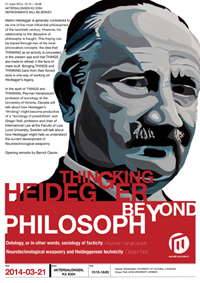As outlined in the notice for the seminar, these discussions aimed to look at Heidegger’s “fraught” relationship to the discipline of philosophy: “This fraying can be traced through two of his most provocative concepts: the idea that THINKING as an activity is concealed in the present age and that THINGS are made to retreat in the face of mere stuff. Bringing THINGS and THINKING back from their forced exile is one way of working on Heidegger’s legacy.”
Berndt Clavier opened the seminar by describing an ongoing momentum in Heidegger studies that has seen his work being increasingly picked up on by disciplines nominally outside of philosophy. How much of the most interesting writing on Heidegger is currently happening in these non-philosophical spaces. Heidegger’s “thing thinking” is bound to take one outside of philosophy. Indeed, the very question of being that took Heidegger into philosophy was what eventually took him out of it as a result of his emphasis on practices of being. Clavier pointed to Heidegger’s ‘Origin of the work of art’ essay as a key point of reference for the seminar, with its highlighting of the predicative disposition of language that constructs a seeing subject and passive object, and all of the subsequent entailments of such an arrangement in which every thing is made to substantiate the subject, as can be seen in the array of conventional representational apparatuses and their theatre of anthropormorphisms. Clavier then opened the floor to Vahabzadeh, pointing out that the social sciences carry a memory of these objectifications as they occur and thus are more well-placed than philosophy to use Heideggerian thought.
Continue reading

